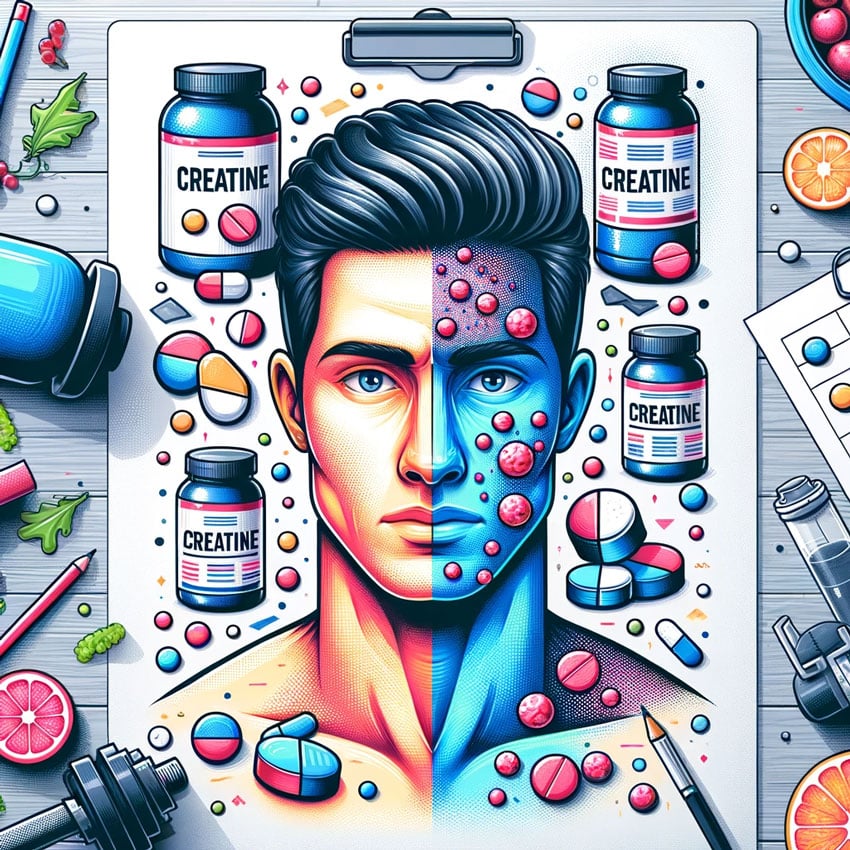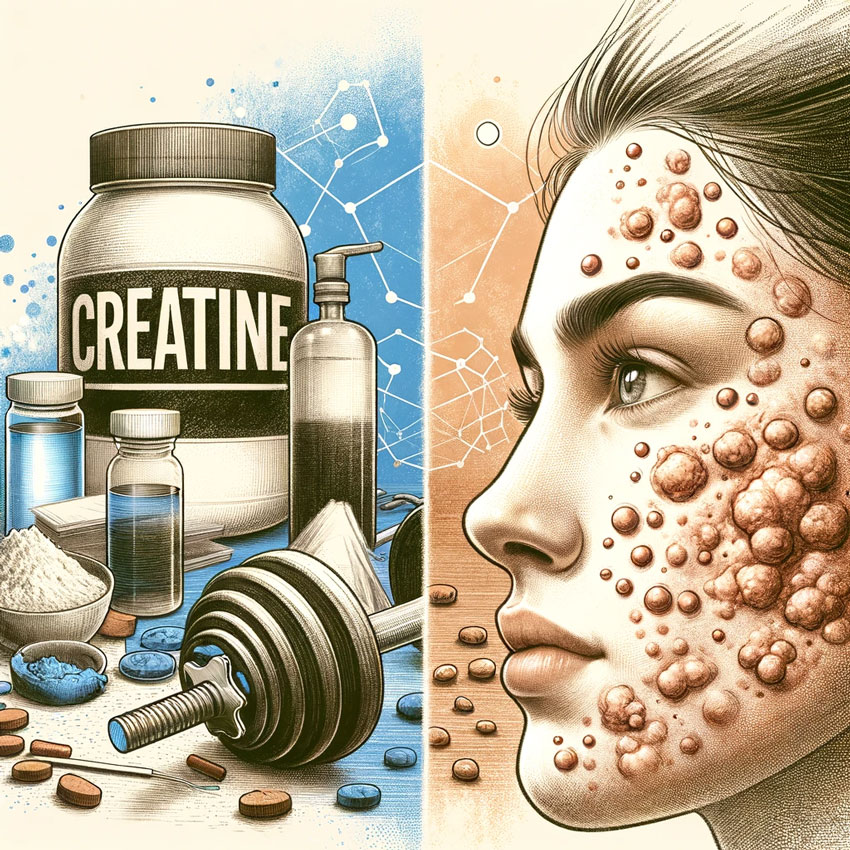Creatine is a popular supplement that is often used by athletes and fitness enthusiasts to improve their physical performance and enhance their workouts.
However, there is a concern among some users that creatine can cause acne or other skin issues. This has led to speculation about whether or not there is a connection between creatine and acne.
Understanding Creatine and Its Role
Creatine is an amino acid that is naturally found in the body and is also available as a supplement. It is primarily stored in skeletal muscle and is involved in energy production during muscle contraction.
Creatine supplements are popular among athletes and bodybuilders as they are believed to enhance physical performance and help build muscle mass.
Creatine works by increasing the level of phosphocreatine in the muscles, which helps to produce ATP (adenosine triphosphate). ATP is the primary source of energy for muscle contraction.
By increasing the level of ATP, creatine helps to improve muscle strength, endurance, and overall performance.
While creatine is primarily known for its benefits in muscle growth and performance, it also has potential benefits for the brain. Studies have shown that creatine supplementation may improve cognitive function, memory, and mood in both healthy individuals and those with neurological diseases.
Creatine supplements are available in various forms, with creatine monohydrate being the most commonly used and studied form. It is generally safe and well-tolerated, with few reported side effects.
However, there have been concerns about the potential link between creatine and acne.
It is important to note that creatine itself does not cause acne. However, some individuals may experience acne while taking creatine supplements. This is likely due to other factors such as hormonal changes, diet, or skincare habits.

Creatine and Acne: The Connection
The relationship between creatine and acne has been a topic of discussion for some time. While some people believe that creatine can cause acne breakouts, there is no scientific evidence to support this claim. However, there are a few factors that indirectly connect the two.
One hypothesis revolves around creatine’s impact on dihydrotestosterone (DHT), a hormone involved in acne development. Some studies suggest that creatine may increase DHT levels, which can lead to an increase in sebum production and potentially contribute to breakouts. However, other studies have failed to establish a significant link between the two.
Additionally, some people may experience skin issues while taking creatine due to other factors such as clogged pores or dietary habits. It is important to note that acne triggers can vary among individuals, so personal responses to creatine supplementation will differ.
Scientific Studies and Reviews
The International Society of Sports Nutrition (ISSN) has published a review on the safety and efficacy of creatine supplementation. According to the review, creatine supplementation is safe and effective for healthy individuals when taken within the recommended dosage of 3-5 g/day or 0.1 g/kg of body mass/day.
The review also reports no evidence to support the claim that creatine supplementation causes acne.
Several other studies have also investigated the relationship between creatine supplementation and acne. A study published in the Journal of the American Academy of Dermatology found no significant difference in the incidence of acne between creatine users and non-users.
Another study published in the Journal of Strength and Conditioning Research reported that creatine supplementation did not exacerbate acne in athletes with acne-prone skin.
While there is no scientific evidence to support the claim that creatine supplementation causes acne, it is important to note that individual responses to creatine may vary. Some people may experience side effects such as gastrointestinal distress or muscle cramping.
It is recommended that individuals consult with a doctor before starting any new supplement regimen.

Diet, Creatine, and Acne
While creatine supplementation has not been directly linked to acne, several factors may indirectly contribute to acne development. One of these factors is an individual’s diet.
Research suggests that a diet high in processed foods and sugar may increase the likelihood of developing acne. This is because these foods can cause an increase in insulin levels, leading to inflammation and an overproduction of oil in the skin.
Consuming red meat and seafood, which are common dietary sources of creatine, may also impact acne development. Red meat, in particular, has been linked to an increased risk of acne due to its high levels of saturated fat. However, these associations are not conclusive and more research is needed to fully understand the relationship between diet and acne.
In addition to dietary habits, the consumption of dairy products may also play a role in acne development. Some studies have suggested that dairy products, particularly milk, may increase the production of hormones that contribute to acne.
Safe Use of Creatine Supplements
When used properly, creatine supplements are generally considered safe. However, it is important to take certain precautions to avoid any potential risks or side effects.
One of the most important things to keep in mind when taking creatine supplements is to drink plenty of water. Creatine can cause dehydration, which can lead to muscle cramps and other issues.
Drinking at least 8-10 glasses of water per day is recommended when taking creatine supplements.
It is also important to follow the recommended dosage guidelines for the specific creatine supplement being used. Taking too much creatine can put a strain on the liver and kidneys and may cause nausea, diarrhea, and other digestive issues.
It is also important to choose a high-quality creatine supplement from a reputable manufacturer. Some creatine supplements may be contaminated with other substances, such as anabolic steroids, which can be dangerous and illegal.
Finally, it is important to note that creatine supplements are not a magic solution for building muscle or improving athletic performance. They should be used in conjunction with a healthy diet and exercise routine to achieve the best results.

Frequently Asked Questions
Can taking creatine lead to skin problems?
There is no evidence to suggest that taking creatine supplements can lead to skin problems. However, some people may experience acne or other skin issues while taking creatine supplements. This is likely due to other factors, such as genetics, hormonal imbalances, or skincare routines.
What are the potential side effects of creatine?
Creatine is generally considered safe when taken in recommended doses. However, some people may experience side effects, such as stomach upset, muscle cramping, or dehydration. These side effects can usually be avoided by drinking plenty of water and following the recommended dosage.
Is there a link between creatine and acne?
The relationship between creatine and acne is complex. While some studies suggest a potential link, the direct causation remains unclear. Genetics, hormonal factors, and skincare routines can also play a role in acne development.
Can creatine cause hormonal imbalances?
There is no evidence to suggest that creatine supplements can cause hormonal imbalances. However, some people may experience changes in hormone levels while taking creatine supplements. These changes are usually minor and temporary.
What are the risks of taking creatine supplements?
Creatine supplements are generally considered safe when taken in recommended doses. However, some people may experience side effects, such as stomach upset, muscle cramping, or dehydration. Additionally, people with kidney disease or liver disease should avoid taking creatine supplements.
Does creatine affect skin health?
There is no evidence to suggest that creatine supplements directly affect skin health. However, some people may experience acne or other skin issues while taking creatine supplements. This is likely due to other factors, such as genetics, hormonal imbalances, or skincare routines.

